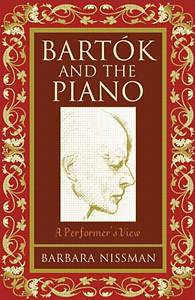|
<< -- 3 -- David Thompson INSPIRING CONFIDENCE

All this emerges progressively as each avenue and stage of musical development is
surveyed. There is much perception in the author's consideration of the larger works,
such as the Sonata, the Sonata for Two Pianos and Percussion, and the concertos.
The analysis is not dense and exhaustive, but we are guided through the important
structural details whilst receiving helpful advice on matters of execution and
interpretation.
I can best describe this book as a series of masterclasses at which we are,
mercifully, not required to put our executant talents under scrutiny. We are given
suggestions for performance, lists of other repertoire which might throw contextual
light on a particular piece, and, on the accompanying CD, our teacher practices what
she preaches in a series of fascinating and revealing examples, cued from the
text.
So what is the sum of the parts? For me, a richly enjoyable read, which, given
the sometimes highly complex subject-matter, is, in itself, a considerable achievement.
The book is also an infectiously enthusiastic piece of musical evangelism, which will
surely encourage readers to venture into, or return to the work of a great and unique
twentieth century composer. That, too, is to be applauded.

'Bartók and the Piano - A Performer's View' by Barbara Nissman. © 2002 Scarecrow Press
|
As I indicated earlier, those who seek rigorous academic analysis must continue to
wait, but for pianists, skilled, failed and aspiring, this is a gem of a book. I now
propose to blow the dust from Mikrokosmos volume 1, open it at the first page
and set my sights on the Six Dances in Bulgarian Rhythm which bring down the
curtain on the final volume. Barbara Nissman has inspired me to dream the impossible
dream, and I thank her.
Copyright © 18 May 2003
David Thompson, Eastwood, Essex, UK

Bartók and the Piano
A Performer's View
Barbara Nissman
Scarecrow Press, 2002
ISBN 0-8108-4301-3, hardback with CD, 336 pages
www.scarecrowpress.com
|
BUY THIS BOOK FROM AMAZON.COM
|

